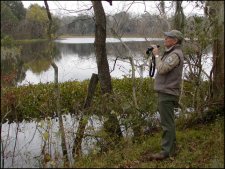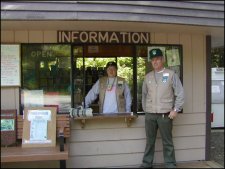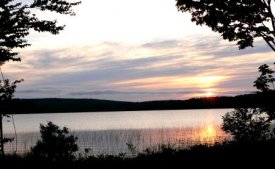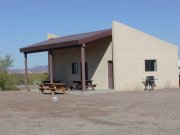Why Do This?
There are many reasons to consider spending at least some of your time as a volunteer when you become a full-time RV’er or an extended travel RV’er. If you have never considered doing this, perhaps you should! In this page I will attempt to explain a little of what we do and why we do it. This is one of those things that an RV’er can do as much, or as little as they wish and the opportunities to do so are almost endless. There are many reasons to try this as well as many benefits to be gained from the experience. As much as we love our RV lifestyle, we really do not care much for living in RV parks. As a result of this life, we spend only short periods in commercial RV parks.
Why Volunteer?
The reasons that we began spending time as volunteers along the way as we travel were mostly due to our limited income when we first went on the road as well as the fact that we believed that we would tire of constant travel in a pretty short time. But in the past three years we have discovered a whole new lifestyle that we never imagined existed. There are many benefits to our way of life and I will only be able to list a few, but this should give you some ideas. We have always been people that were involved in the communities where we lived. Going on the road has not changed that and our volunteer experiences have filled our need for involvement. As a volunteer you have a place to belong as soon as you arrive in a new location. Once introductions are completed you are once again among friends. The other people that choose to do this will usually be people who share your values and who also have the need to contribute, even after retirement. Volunteers tend to see each new community from a position much more like those who live there. We not only see an area in much more depth than does a tourist, but we also become acquainted with many residents. We leave with far more than a hand full of pictures to remember each stop, having frequently made life long friends. And there is always the financial benefit of the free place to stay
What Benefits do Volunteers Receive?
Almost everyone is aware of the volunteers who live in a campground at the local parks. The best-known benefit of the position is the campsite itself. Usually the host will have full hook-ups. In most locations there is a laundry room for the use of volunteers and frequently other things like showers, refrigerators, freezers, and just about any equipment that can be made available with minimal expense to the agency. At times there will also be a phone connection available to the site, but the bill will normally be your responsibility if you choose to have it connected. But if not, there is almost always a phone nearby that you can use if you have a phone card for long distance calls. In some locations propane is also supplied. It is quite common to receive an annual pass to all other parks that are operated by the agency you work for. Frequently, a vehicle will be supplied for use when you are working. On occasion a small stipend will be given to cover your expenses, and rarely there will also be extra work available to you for some small rate of pay. Volunteers are not targets of the IRS for their free campsite under the barter rules like paid work-campers are starting to be. There is almost always access to workshops and office equipment, should you wish to use them. Another money saving advantage to this life is the knowledge of where to shop for anything you want in order to receive the best quality and lowest prices. This can be quite significant in some locations. And you should never under-rate the value of the appreciation that is expressed along the way. There is no paid employee who's boss, no matter how great, will approach the gratitude that is typically expressed to those who work as volunteers.
Who uses Volunteer Staff Members?
There is an amazing array of locations that seek help from people willing to volunteer, and the list is growing. Almost every agency that has public parks have at least some that use volunteers as a part of the staff. We have worked for state parks, county parks, a wildlife refuge, and a department of forestry. Most public land agencies, like the BLM, Corp of Engineers, Bureau of Reclamation, US Fish & Wildlife Service, and the National Park Service use volunteers in many different positions. Nearly all states now have at least some parks with campground hosts, and many use volunteers as interpreters, tour guides and in maintenance or living history. In several states game and fish departments now use volunteers, along with many counties and some cities. There are also nonprofit organizations that seek volunteer help such as the Nature Conservancy, church camps, and a number of others. More and more tight budgets are causing organizations in the government and not-for-profit agencies to seek to fill positions with volunteer workers. And as that happens a wider range of jobs and jobs with more responsibility are opening to volunteer service.



Different Work at Different Locations
The work that is done in the volunteer positions is as varied as the places that you find positions. Everyone knows about the campground host that greets campers and answers questions. While this is still the most common position for volunteer service by RVers, it is by no means the only one. There are many places that use volunteers to do lawn care and general maintenance. There are locations where volunteers feed fish, run farm machinery, plant trees, and just about every skill that you might have. We even know of two heavy equipment operators that run bulldozers for the Fish and Wildlife service. There are many organizations that seek people with office and retail skills as well as computer knowledge. I have been asked about website creation on more than one occasion. There are even places that wish only for the volunteer to live on site for reasons of security. But you should be sure that you understand what the agency is asking to insure that you can do the job and that it will not be something that you will enjoy doing. A few places do ask volunteers to do such things as cleaning, so use some degree of care. You should spell out in writing if there is a particular job that you are not willing to do, like cleaning restrooms. Most locations will be inclined to try and find things that they need done which you enjoy doing. As volunteers become more in demand, the work that they are offered is becoming more meaningful. You can usually find work with as much or as little responsibility as you wish. You should also make sure that the coordinator is aware of any health restrictions that you may have. Some examples of things that we have done that you may not have thought of are art work, bookkeeping, grant applications, teaching school children about a historic site, fence construction or removal, farm equipment operation and repair, wood restoration, carpentry, electrical wiring and repair, wildlife observation, fee collection, campsite repairs, sign posting, and a host of others. With the exception of those locations that the RV'er is just on site for security, there is always a minimum number of hours required of a "live on" volunteer. It is quite rare for that requirement to be any fewer than twenty hours total per week for the campsite. Often the required hours will be slightly higher for a couple than for a single person. Common numbers are twenty hours for a single and twenty four hours split between two, for a couple. Frequently the agency may ask for more. We have been in locations where the required hours were seldom actually asked for, but they nearly always ask you to record at least the minimum number of hours for their reports to the supervisors. Generally, the federal agencies ask for more hours of service than do the states and counties. We have worked as much as three days per week each, for our site and utilities. But we also found that with the greater time requirement went more responsibility and more challenging and enjoyable work. Interestingly, the two places that we enjoyed our work most were the two where we worked the most hours. Do not assume that when you go to another location for the same agency the time asked for will remain the same. While that is usually the case, there are exceptions so always ask. It is also quite common for people to become so involved in the organization that they find themselves working extra hours to accomplish goals, not because they were asked to, but because they want to. When you consider the hours that are asked for, keep in mind that this is a volunteer position with benefits, and not a case of barter of services for a site. There is a reason that IRS rules specifically exempt "live on" volunteers from any tax liability for the value received. If you are seeking a good return in financial value for your labor in terms of an hourly rate, you will find very few positions that are worthy of your time, but if what you seek is satisfaction and a feeling of contribution as well as interesting experiences and new things to learn, this may well be the lifestyle for you.
Finding places to Volunteer
There are many ways to find places to volunteer. Probably the best way to get started is to subscribe to the "Workamper News". If you are not familiar with this magazine, it is published bimonthly and is mostly ads from people who wish to hire RVers for seasonal help, sprinkled with ads from public and private non-profit organizations that seek RVers to volunteer their time in return for free camping. The magazine is well worth the money and it has been the primary source of locations for us in our first six years of this lifestyle. There are also many other ways to locate positions. The Internet is a good place to do a search. Look at any agency that has parks, such as the Corp of Engineers, BLM, Bureau of Reclamation, and the National Park Service. The Forest Service also uses volunteer hosts, but most of the campgrounds that they have are now being contracted to private companies and the jobs are usually paid and do much more work than we usually are interested in. The TVA and the US Fish and Wildlife Service also use volunteers. Nearly all state park systems have at least a few volunteer positions, with some states having several positions at each park. Of the states we have visited, Oregon and Texas use the most volunteers in their parks. Many cities and counties are now using volunteers in their parks and in several states the Game & Fish Department now use volunteers. We watch for volunteer host sites in parks as we travel and when we see them we always take time to ask how they got the position and how they like the work at the park. It is not difficult to locate a place to spend some time if you are serious about volunteering.
Getting the Position
Once you locate the place that you want to volunteer, the next thing to to find out if it is a good fit for you. First you must make contact. While some ads do give a mailing address, I would only use the US mail for positions that are many months away. If there is an e-mail address available, that is usually my first choice. If it is a location or position that I especially want, I will call them on the phone. Don't be afraid to call a park that has no ads or other indication that they are looking for volunteers, if it is one that you really want to spend some time in. They may not have a position, but very often they do. And I have never known anyone to have been offended by a call about volunteerism. It is just as important to let the volunteer coordinator know what you are not willing to do, as it is to find out what they want you to do. When you believe that you understand, it is good to repeat back to them what you believe to be the requirements in hours worked and in duties. While most coordinators do try and find work that the volunteers enjoy, it is only normal for them to have at least some specific plans for what they wish to accomplish. There is usually an employment application that must be filled out. If you will be driving a motor vehicle they usually want to check your driving record. Some parks also ask for your social security number in order to do a background check. This is done at many parks where you will have public contact. A short resume is helpful to the coordinator also. It should be one to two pages and it should tell what you have done that might apply in this position. If you have experience in other positions as a "live on" volunteer, list them along with a brief explanation of your duties as well as the name of your supervisor and how to contact him. While coordinators do like to have volunteers with prior experience, it is far from necessary. Everyone starts with no previous experience and most all of us come from a career of some type where we had a lot of experience.
What's left to do?
Many people always go and visit a location prior to accepting a position. While that is perhaps a good approach, for us it doesn't work because we choose locations in areas that we have never visited and so we almost never see the next site until we arrive for our stay. For us that has worked very well but we do spend some time in discussing it in detail with the staff. We also usually ask for a digital picture of the RV site, unless we have known someone who has previously been there. Once you have booked into a location, it is wise to make contact again just a few weeks before you actually travel to the location. They will want to know what day to expect you and you will need to know when the site that you are to occupy will be available to you. Some parks will have a place for you to stay if you arrive a few days early, but not all, so make sure. We usually try to arrive in the area a few days early just to be ready to start work at the time they are expecting us. When we arrive in the area, we normally unhook our toad in a local store parking lot and drive to the park to make contact with the staff and to check out where we will be staying. If we are going to be campground hosts, this is less important as they will have good access, but in some day use facilities the host sites are in unique locations. At this moment we are parked beside a conference center, with the rear of our motorhome actually in the entry to a courtyard. It happens to work very well since we are sheltered from any winter wind, and we have a nice tree and view out of the front windows. But getting parked was a bit more of a challenge than it would be in a normal campground. At this point you should be all set to spend some time in what will be a new and wonderful experience. We have learned more new things and had more new experiences since we began this life than one could ever imagine. Our only regret is that it does take quite a period of time to get around to all of the different things that there are to do. For that reason we have now begun to limit our term of stay to no more than three months and we no longer return to the same location unless it happens to be close to our grandchildren. It is a wonderful life, so have fun!





